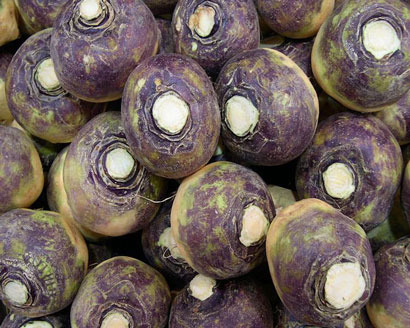The Food Almanac: Friday, February 1, 2013
In The Food Almanac, Tom Fitzmorris of the online newsletter The New Orleans Menu notes food facts and sayings.
Days Until. . .
Mardi Gras–11
Valentine's Day–13
Eating Across America
Grand Central Terminal in New York City opened today in 1913. At the time, it was the largest train station in the world. It's still a grand place, and if you ever show up there hungry go down below to the Oyster Bar and Restaurant, a fixture in the terminal for decades. The Oyster Bar's vaulted tile ceilings make for a unique environment. Last time I was there (September 2006), I counted thirty different kinds of oysters available. None from Louisiana–boooo! The prices–a buck and a half to two dollars per oyster–are shocking to us Orleanians.
Celebrity Chefs Today
In 1982, former Ma Maison chef Wolfgang Puck opened Spago in Los Angeles, starting any number of trends that can be seen in restaurants all over the country, including here. Spago made pizza glamorous, for example. Puck now has countless restaurants bearing his name around the country, no small number of which are convenience cafes in places like airports.
Today's Flavor
Don't be frightened by this, but it's Rutabaga Day. Rutabagas are among the most misunderstood and underrated vegetables in this country. It's a cross between the turnip and a variety of wild cabbage. It has been raised for food since at least the 1600s. It's always been popular in Scandinavia. For that reason, the name for the vegetable in Great Britain is "swede." I encountered that word on a trip to England a couple of years ago, when I bought a Cornish pasty stuffed with swede/rutabagas.
Rutabagas look like turnips, but are bigger and lack the sharp turnip flavor. They're much starchier, too, and can be used in almost any recipe you'd use for potatoes. The color of the flesh is a bright yellow-orange. When mashed, it looks a bit like sweet potatoes. My own favorite use for rutabagas is to slice them and bake them with cream, cheese, butter, garlic and bread crumbs as a gratin. Great side vegetable with almost anything.
The Old Kitchen Sage Sez:
Be sure to peel rutabagas before cooking them. They're usually coated with a wax to keep them from going soft too soon after harvest. They should be very firm.
Gourmet Gazetteer
Crawfish Branch, Kentucky is at the intersection of Crawfish Branch Road and Crawfish Cemetery Road. Thinking about who or what may be buried in Crawfish Cemetery intrigues the mind. Are there crawfish chimneys there? Any really big ones made of stone? The place is in the hills on the west slope of the Appalachians, in the center of the state, not close to any major cities. Most of the nearby restaurants are fast-food places, but Lee's Famous Recipe Chicken, a mile away in Manchester, sounds edible.
Deft Dining Rule #534:
The idea that little towns in the middle of nowhere always have a great little cafe with home cooking is only a romantic myth.
Edible Dictionary
aperitif, [ah-pehr-ih-TEEF], French, n., adj.–The word translates roughly as "the opening," meaning the introduction into a meal. At one time aperitif meant either food and drink before the main part of a meal. But the expression "amuse-bouche" has taken over the food side of aperitif, while "cocktail" is used for spirits-based initial beverages. This leaves light, chilled wine (usually white) as what is implied when aperitifs are mentioned. An aperitif wine is usually a sign that there will be quite a variety of other wines through the meal.
Restaurants Through History
Today in 1960, in Greensboro, North Carolina, four black college students stopped at aWoolworth's to buy school supplies. They wanted to have coffee at the lunch counter, but were told that it was white-only and were refused service. They sat there until the counter closed. Their action started a movement, and sit-ins began occurring at other white lunch counters throughout the South.
World Records In Food
A Cuban cow by the name of Ubre Blanca was milked on this day in 1982 and delivered 28 gallons of milk–a record. That's nearly four times what the typical cow produces. Imagine the flan you could make with that!
Perhaps the achievement of Ubre Blanca occurred through the intercession of St. Brigid of Ireland, whose feast day it is today. She is the patron saint of milkmaids, and anyone who works in any part of the dairy industry.
Regional Culinary Differences
Today in 1939, a Maine assemblyman named Seeder introduced a bill in the legislature banning the use of tomatoes in clam chowder. You know, of course, that New England clam chowder is made with milk or cream, and that Manhattan clam chowder has tomatoes. James Beard said that the latter was like "vegetable soup with some clams dumped into it." Here in New Orleans, we don't care one way or another, because we don't like clams.
Food And Drink Namesakes
Sir Edward Coke was born today in 1552. He was a lawyer whose ideas about the supremacy of the common law of the people over the whims of the king gave shape to the British legal system. . . Hattie Caraway, the first elected female U.S. Senator, was born today in 1878. . . Canadian hockey player and coach Mike Kitchen was born today in 1956. . . Outfielder Zack Wheat was elected to the Baseball Hall of Fame today in 1959.
Words To Eat By
"To me, an airplane is a great place to diet."–Wolfgang Puck.
"Plain cooking cannot be trusted to plain cooks."–Countess Marcelle Morphy, British cookbook author in the 1930s, reputed to be a native of New Orleans.
Words To Drink By
"A good general rule is to state that the bouquet is better than the taste, and vice versa."–English writer Stephen Potter, speaking of wine. He was born today in 1900.
